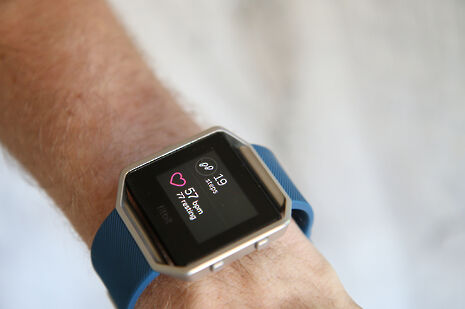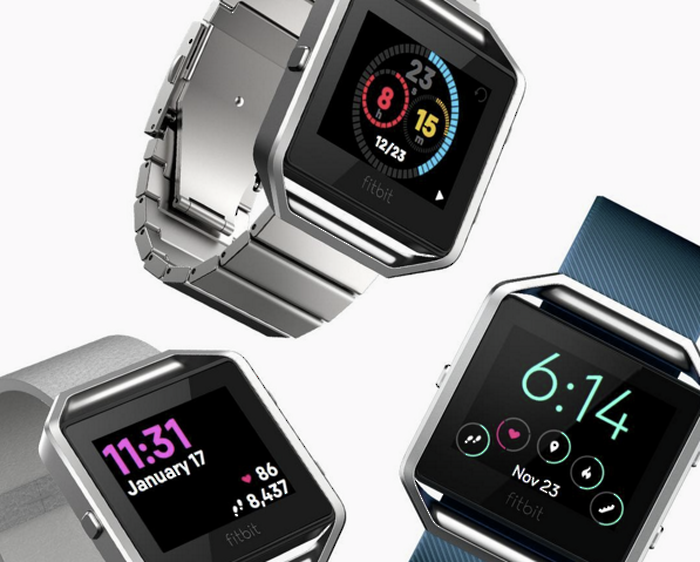Health hyper-awareness and its phantom problems
Is the Fitbit taking our obsession with bodily self-monitoring to an unhealthy extreme, asks Jemma Slingo

Odd things happen in January. On New Year’s Day, I discovered my mum power-walking the length of the kitchen. ‘Morning’, she wheezed, as she performed her seventeenth lap of the island. ‘Morning’, I replied, narrowly avoiding my dad, who was jogging in front of the dishwasher.
This was not a display of turkey-induced delirium. No, my family is in the grip of an obsession: an obsession with Fitbits. Ever since we unwrapped the gadgets on Christmas Day, conversation has consisted of step-counts, activity-hours and trekking targets. Sitting down has become a cardinal sin.
“What’s truly striking about Fitbits is their power to influence behaviour”
Fitbits are the front-runners in wearable fitness technology. They monitor the steps you’ve taken, the calories you’ve burnt, the distance you’ve travelled and the blood you’ve pumped, and display the data in elaborate online graphs. The Fitbit app also lets you keep a food diary, (not a good idea over Christmas, it turns out) and tracks your sleep patterns. To look at, they’re a cross between something you’d see in Black Mirror and the rubber wristbands you get in swimming pool changing rooms. Personality-wise, they’re somewhere between a P.E teacher and a life coach, vibrating crossly when you sit down for too long and lavishing praise when you eventually move. (‘Solid stepping!’).
What’s truly striking about Fitbits is their power to influence behaviour. Day one, and you’re a rational human being. You decide to walk up the hill, rather than catch the bus. Your wristband buzzes with pleasure. Next thing you know, you’re Zumba-ing your way to the kettle. Unlike most things to do with health and the internet, however, Fitbits don’t exploit our desire to show off. Although you’re given the option to ‘share’ your progress on Facebook and Twitter, the graphs are mainly of interest to you. (Scrap that: only of interest to you. If you’re reading this, Mum, take note.) Psychologically, it’s not the same as posting pictures of your nut butter porridge on Instagram. It’s not about generating an illusion of blissful health.
“Isn’t there something unnatural about being hyper-aware of your body?”
That’s not to say that your stats remain confidential. Oral Roberts University in Oklahoma has introduced a program in which freshers wear fitbits and pass on the data to university staff; those who opt-out are expected to record their aerobic activity manually. Meanwhile, The New York Times has revealed that most activity trackers leak personal information via Bluetooth. Exactly what Russia would do with my step-count remains a mystery, but it’s still a disquieting thought.
The fact remains, however, that we’re mainly monitored by ourselves. Why, then, do we take such delight in these buzzing, flashing bracelets? Why do we want to quantify our existence? I suppose, in logging our lives, we can track improvement. Even if we’re still just as rotund as we were on Boxing Day, we feel like we’re achieving something. There’s tangible evidence. What’s more, targets are broken down into manageable chunks; the goal to walk 10,000 steps every day is more achievable than the goal to look like Gisele by the end of February.
But something’s troubling me. Isn’t there something unnatural about being hyper-aware of your body? Does flesh really require constant attention? The obsessive self-monitoring encouraged by fitness trackers reminds me of certain food fads. Look, for example, at the people – not coeliac sufferers, I add – who are ‘allergic’ to gluten. The people who insist that wheat ‘aggravates their gut’ and ‘upsets their natural balance’. They don’t seem to realise that excessive amounts of bread makes everybody ‘bloat’ – it’s a tragic fact of life. What I’m saying is that if you track your body closely enough, you can unearth a host of phantom problems. Sometimes it’s healthier to stop thinking about health; to leave your body to it.
It’s too late for me, though. I’m off for a power-walk.
This article originally stated that Orel Roberts University students were required to wear fitbits. This was incorrect. As now stated, students have the option to opt-out and manually record their aerobic activity.
 News / Clare Hall spent over £500k opposing busway 24 December 2025
News / Clare Hall spent over £500k opposing busway 24 December 2025 Comment / The ‘class’ of Cambridge24 December 2025
Comment / The ‘class’ of Cambridge24 December 2025 News / Caius mourns its tree-mendous loss23 December 2025
News / Caius mourns its tree-mendous loss23 December 2025 Comment / League tables do more harm than good26 December 2025
Comment / League tables do more harm than good26 December 2025 News / Girton JCR publishes open letter expressing solidarity with Palestine25 December 2025
News / Girton JCR publishes open letter expressing solidarity with Palestine25 December 2025









